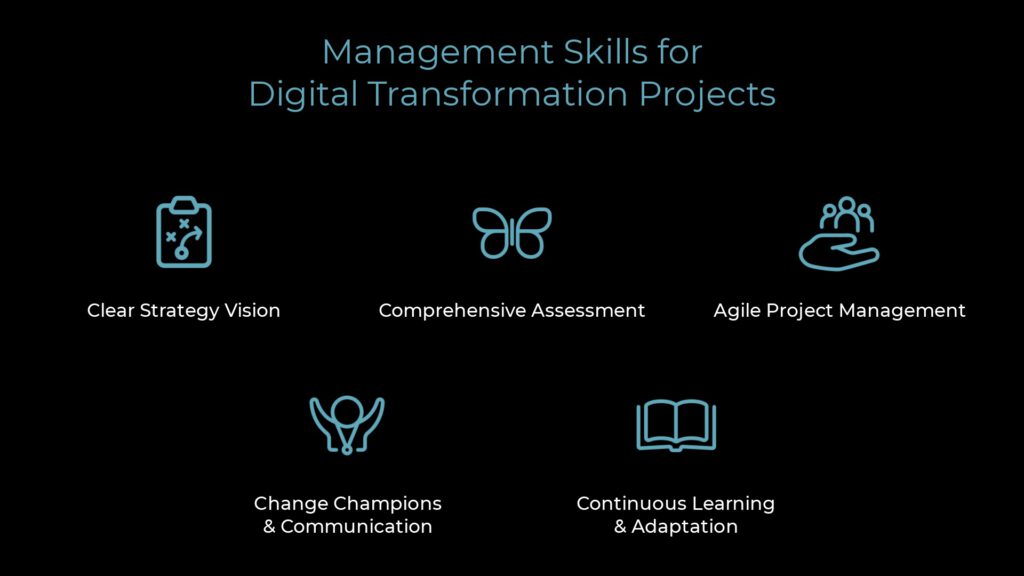
In today’s rapidly evolving business landscape, digital transformation has become a critical journey for companies aiming to stay competitive and relevant. The process involves adopting digital technologies and strategies to fundamentally change how an organization operates and delivers value to its customers. However, embarking on a digital transformation journey is no small feat; it requires meticulous planning, strategic thinking, and adept project management. In this article, I will delve into the top 5 points to consider when managing a digital transformation project, with a special focus on Change Management and Agile Coaching expertise.
1.Clear Strategic Vision: The foundation of a successful digital transformation lies in a well-defined and clear strategic vision. Before diving into the technical aspects, it’s essential to understand the “why” behind the transformation. As an expert in Change Management, I can guide the process in articulating the need for change and its potential benefits. I collaborate with stakeholders to align their expectations and create a shared vision of what the transformed organization will look like.
2. Comprehensive Assessment: Conduct a thorough assessment of the organization’s current state, including its processes, technologies, and culture. An expertise in Change Management identifies potential areas of resistance and design strategies to address them. With Agile Coaching principles you can apply a culture of continuous improvement and adaptability. By involving teams in the assessment phase, you are able to gain valuable insights and build a sense of ownership among them.
3. Agile Project Management: Digital transformations are inherently complex, often involving multiple interdependent projects. Agile methodologies can be your best friend in this context. By leveraging Agile Coaching skills, you can introduce iterative planning, incremental development, and regular feedback loops. This approach enhances flexibility, enabling the project to adapt to changing requirements and market dynamics. A role in Agile Coaching will be pivotal in fostering collaboration, empowering teams, and ensuring Agile practices are effectively implemented.
Have you already been able to successfully implement Agile working methods? Have you also had the experience of achieving results faster because you were able to react flexibly and quickly to unexpected challenges?
4. Change Champions and Communication: Change Management expertise is crucial for identifying and nurturing change champions within the organization. These individuals will play a pivotal role in promoting the transformation and influencing their peers positively. Collaborate with these champions to develop a robust communication strategy that keeps all stakeholders informed and engaged throughout the journey. Skills in Change Management will ensure that resistance is addressed proactively, and concerns are transformed into opportunities for growth.
5. Continuous Learning and Adaptation: Digital transformation is an ongoing process, not a one-time event. An Agile Coaching background will be immensely valuable in instilling a culture of continuous learning and adaptation. Encourage teams to embrace a mindset of experimentation, where failures are seen as learning opportunities. Regular retrospectives, a hallmark of Agile methodologies, will help teams reflect on their progress, identify bottlenecks, and make informed adjustments.
How many projects have you been able to bring to success? What methods have you used in the process?
Is your company currently undergoing a digital transformation? Is it planned or already completed?
In conclusion, the project management of a digital transformation demands a strategic approach, thorough assessment, agile methodologies, change champions, and a commitment to continuous improvement. A dual expertise in Change Management and Agile Coaching equip with the tools to navigate these challenges adeptly. By weaving these principles into the fabric of the transformation, you can guide the organization towards a successful digital future, where change is embraced, and agility becomes a competitive advantage.